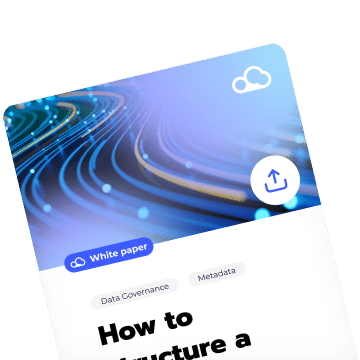The demand for Data Scientists is booming due to the rapid increase in data generation and speed – The Bureau of Labor Statistics predicts that Data Scientist roles will grow 36% by 2031.
But what, exactly, do Data Scientists do? This blog post will explore the key roles and responsibilities of Data Scientists, best practices for success, and discuss their role in data governance.
Key responsibilities of a Data Scientist
The significance of data science is undeniable. Yet, many organizations still struggle to integrate data-driven decision-making into their operations. Data Scientists help create and deliver actionable insights necessary to drive innovation and growth. The primary responsibilities of Data Scientists include:
Data cleansing: Data cleansing is a fundamental aspect of accurate analytics and predictions – It helps identify and resolve issues such as missing values, outliers, and inconsistencies in datasets. Common data cleansing methods include:
- Addressing missing data: Using techniques like mean and median imputation or others to fill in missing data.
- Identifying and removing outliers: Detecting and rectifying errors like missing values, outliers, and inconsistencies in data sets.
- Standardizing data: Ensuring data meets specific requirements for machine learning or statistical modeling.
- Data transformation: Converting raw data into a suitable format for analysis.
Data modeling: As a Data Scientist, crafting efficient, scalable, and practical models is a core skill. Data Scientists determine and apply the appropriate machine-learning algorithms and statistical modeling techniques. Some traditional modeling techniques include:
- Supervised learning: Training models on labeled data to make predictions on new, unseen data.
- Unsupervised learning: Identifying patterns and relationships in unlabeled data using clustering or dimensionality reduction techniques.
- Regression analysis: Predicting continuous outcomes using linear or nonlinear regression models.
Translating data into business insights: Creating narratives to turn data intricacies into understandable business insights. This includes:
- Clear communication: Presenting findings in a concise and accessible manner to non-technical stakeholders.
- Storytelling: Using narratives to convey insights and engage stakeholders in data analysis.
- Visualization: Creating compelling visualizations to give understanding and prove the validity of their analysis.
Other responsibilities: Data Scientists may hold other obligations depending on company size and project scope:
- Data engineering: Designing and implementing data pipelines to extract, transform, and load data.
- Data privacy and security: Ensuring sensitive data’s secure and ethical handling.
- Collaboration: Interacting with cross-functional teams, including data engineers, product managers, and business leaders.
By fulfilling these critical responsibilities, Data Scientists drive business success via data-driven decision-making.
Top governance challenges impacting the Data Scientist role
Data Scientists in governed environments face several challenges, including:
- Limited access to data due to restrictions on data usage and sharing.
- Complex and ever-changing regulatory requirements.
- Difficulty in balancing the need for data exploration and exploitation with governance.
- Limited resources and support for data governance.
Winning Strategies: Balancing the Data Scientist Role and Governance
To overcome these challenges, Data Scientists can use several strategies, including:
- Collaboration with governance professionals to understand and address regulatory requirements.
- Developing governance frameworks that align with business objectives and regulatory mandates.
- Implementation of data quality and validation processes to ensure data reliability and integrity.
- Utilization of cloud-based platforms and tools that provide built-in governance features.
Teamwork in the role of Data Scientist
In a modern data mesh architecture, data is distributed across domains and systems that create a centralized framework for data management and governance to streamline the work of Data Scientists by eliminating the search for and cleaning of data before beginning analysis.
A well-functioning data governance team significantly improves organizational productivity and efficiency. For Data Scientists, this means deriving insights and making informed decisions. Even outside data mesh architectures, direct involvement with governance benefits Data Scientists: Partnering in the development of frameworks promotes collaboration and simplifies their work processes.
Key best practices elevating the role of Data Scientists
For Data Scientists, best practices are essential for achieving successful data-driven outcomes. These best practices include:
- Documentation and traceability: Properly documenting data lineage and processing histories supports accountability and reproducibility of results. Keep detailed records of work, including the data sources, the methods used to process and analyze it, and the results obtained.
- Ethical considerations: Data Scientists are responsible for collecting, storing, and analyzing data ethically. Privacy, bias, and transparency must be considered when working with any data type. Collect and use data in a way that respects individuals’ rights and benefits society as a whole.
- Continuous learning: Data Scientists must remain informed about technological advancements and new methodologies. Attend conferences, read research papers, and take courses to expand knowledge and skills.
- Specific practices in governed environments: Observe data governance policies and standards when working within governed environments. Use data catalogs and metadata management, document and trace lineage, and process history.
- Collaboration with cross-functional teams: Data Scientists should build and maintain partnerships with IT, legal, and other business stakeholders to identify and resolve technical issues, clarify regulatory requirements, and set shared goals and metrics.
Data Scientists can bypass many barriers by employing these best practices. Observing ethical norms and governance rules will avoid negative consequences, and building diverse relationships can help resolve bottlenecks and remove obstacles to progress.
The evolving role of Data Scientists: Potential future trends
The growing demand for data-driven decision-making will shape the future of the Data Scientist role. Here are a few potential changes in the role of the Data Scientist based on current industry trends:
- Increased focus on data quality and integrity: Data quality and integrity will become even more vital as the demand for insights grows. In the future, Data Scientists will continue to work with governance to standardize secure and reliable data.
- Greater adoption of automation and machine learning: Automation and machine learning will become integral to managing and analyzing data. Data Scientists should leverage these technologies to streamline workflows and improve their analyses.
- Increased emphasis on communication and storytelling: Articulating complex insights through storytelling will become the standard for sharing. Sharing findings to non-technical parties will require straightforward, actionable recommendations, avoiding technical jargon.
The ongoing need for adaptability & lifelong learning
Data science is rapidly evolving, and Data Scientists must commit to being lifelong learners to stay ahead of the curve. New technologies and methodologies will require updated skill sets and expanded areas of expertise.
Conclusion
Data Scientists are at the crossroads of innovation, ethics, and governance. Beyond analysis, their role encompasses ethical considerations, governance, and the dynamic tech landscape. Their future success demands adaptability, continuous learning, and strong collaboration. Data Scientists will continue to bridge the gap between information and integrity as the data universe transforms.
Discover personalized metadata management and data governance – Turn to DataGalaxy to create your company’s data lineage mapping, develop a standardized business glossary, and much more! Check our calendar and select a date that works for you.
Jumpstart your free 15-day platform trial access to start making the most of your data today!





